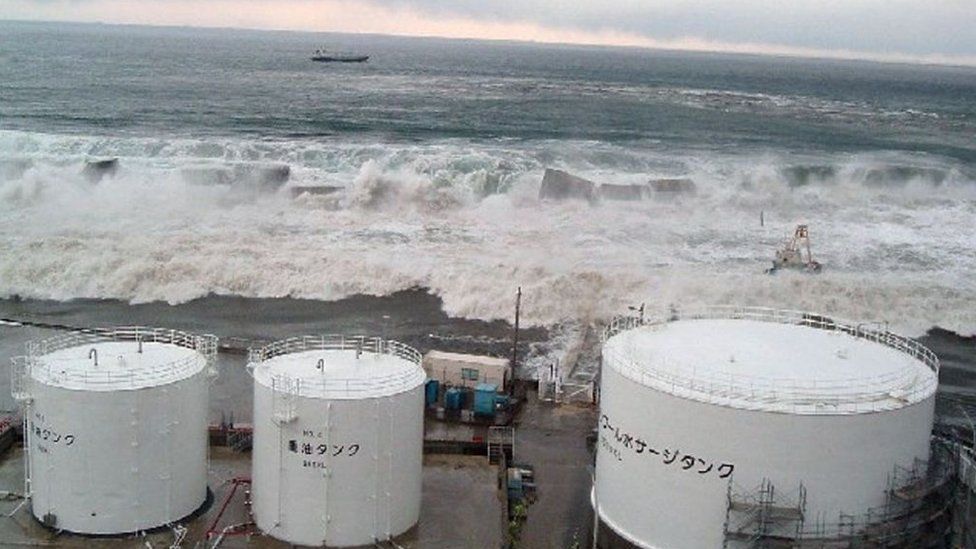apan has approved a plan to release more than one million tonnes of contaminated water from the destroyed Fukushima nuclear plant into the sea.
The water will be treated and diluted so radiation levels are below those set for drinking water.
But the local fishing industry has strongly opposed the move, as have China and South Korea.
Tokyo says work to release water used to cool nuclear fuel will begin in about two years.
The final approval comes after years of debate and is expected to take decades to complete.
Reactor buildings at the Fukushima power plant were damaged by hydrogen explosions caused by an earthquake and tsunami in 2011. The tsunami knocked out cooling systems to the reactors, three of which melted down.
More than a million tonnes of water have been used to cool the melted reactors.
Currently, the radioactive water is treated in a complex filtration process that removes most of the radioactive elements, but some remain, including tritium – deemed harmful to humans only in very large doses.
It is then kept in huge tanks, but the plant’s operator Tokyo Electric Power Co (TepCo) is running out of space, with these tanks expected to fill up by 2022.
About 1.3 million tonnes of radioactive water – or enough to fill 500 Olympic-sized swimming pools – are currently stored in these tanks, according to a Reuters report.
Is there opposition?
Environmental groups like Greenpeace have long expressed their opposition to releasing the water into the ocean.
The NGO said Japan’s plans to release the water showed the government “once again failed the people of Fukushima”.
The country’s fishing industry has also argued against it, worried that consumers will refuse to buy produce from the region.
The industry was hit extremely hard after the 2011 disaster, with many countries banning the import of sea food caught off Japan’s north-eastern coast.
The decision has also prompted criticism from Japan’s neighbours. Ahead of the decision, South Korea’s foreign minister on Monday expressing “serious regret”.
Chinese foreign ministry spokesman Zhao Lijian also urged Japan to “act in a responsible manner”.
“To safeguard international public interests and Chinese people’s health and safety, China has expressed grave concern to the Japanese side through the diplomatic channel,” Mr Zhao said.
The US appears to support Japan’s decision, however, saying it seemed to have “adopted an approach in accordance with globally accepted nuclear safety standards”.
How safe is this water?
Japan argues that the release of the waste water is safe as it is processed to remove almost all radioactive elements and will be greatly diluted.
The plan has the backing of the International Atomic Energy Agency, which says the release is similar to the disposal of waste water at other plants around the world.
“Releasing into the ocean is done elsewhere. It’s not something new. There is no scandal here,” IAEA Director General Rafael Mariano Grossi said in 2021.
Scientists argue that the elements remaining in the water are only harmful to humans in large doses. With dilution the treated water poses no scientifically detectable risk, they say.
While the tritium is radioactive, it has a half-life of around 12 years, meaning it will disappear from the environment over a period of decades rather than centuries.
Radiation from tritium can be ingested, however, which is why fishing industry groups are concerned about the risk of it getting into the food chain and being consumed through sea food.
The risk of this happening is not zero, but the scientific consensus is that it does not pose a threat to human health.
Scientists also point out that vastly more radiation has been released into the pacific by nuclear weapons tests carried out by the US, UK and France during the 1940s, 50s and 60s.
What happened in Fukushima?
On 11 March 2011, a 9.0 magnitude earthquake struck off the north-eastern coast of Japan, triggering a 15-metre tsunami.
While the back-up systems to prevent a meltdown at the Fukushima nuclear plant survived the initial quake, further damage was inflicted by the tsunami.
As the facility’s cooling systems failed in the days that followed, tonnes of radioactive material were released. The meltdown was the worst nuclear accident since Chernobyl in 1986.
Around 18,500 people died or disappeared in the quake and tsunami, and more than 160,000 were forced from their homes.









Discussion about this post